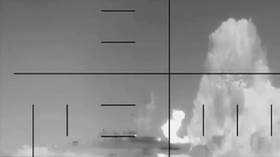The ‘resurrection’ of Ghengis Khan
Persona non grata in Communist times, medieval leader Ghengis Khan has made a comeback adorning posters, bottles, and even the local currency in Mongolia.
Hundreds of people flock to the main square of the Mongolian capital to celebrate university graduation day. Attracting them the most is the statue of the great medieval warrior Ghengis Khan.
Even today he remains a prominent figure in the social life of the country. The fact that he lived around eight hundred years ago does not seem to matter.
“Ghengis Khan is the father of our nation. He's our main pride. And it's important for us to share our achievements with him,” said one of the graduates.
“My grandson has graduated today, and our whole family came to capture this grand moment with the great spiritual and state leader,” said one grandmother.
Born in the 12th century, Ghengis Khan created and ruled the largest empire in history. Uniting all Mongolian tribes, he went on to brutally conquer Asia and much of Europe. His empire encompassed half of the known world.
Around the globe his name became a byword for barbarism.
But in his homeland monuments are erected – like a 40 meter statue outside the capital Ulan Bator.
Many have tried to unravel the mystery of the Great Mongol Ruler and warrior. Mongolians themselves believe that it was his rough early years in the country's plains that gave Ghengis Khan the strength and character to create the largest empire of those times.
Under Communist rule, the mere mention of his name was outlawed. Now, after almost 20 years of democracy, there is no escaping him.
Hotels and night clubs now bear the Great Khan's name. Peering from labels of energy drink, beer, and vodka bottles is a familiar face – now more benign than bloodthirsty.
Mongolia's most famous son may be long dead but he can still be put to good commercial use.
“It is very important that the name of the Great Khan is being revived. But it should be used as a brand only for the best products available,” said Perev Davaanyam, Head of Chindges Khaan Academy.
After socialism faded, Mongolia was searching for its national identity.
Genghis Khan fitted the bill. He's now become a historical figure capable of resurrecting a sense of greatness that keeps a nation with a fragile economy and infrastructure united.












